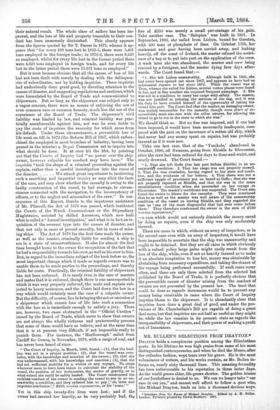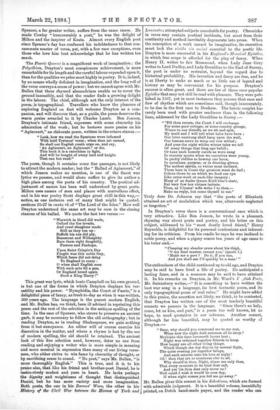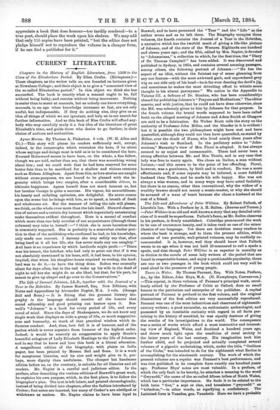MR. BULLEN'S SELECTIONS FROM DRAYTON.* DRAYTON holds a conspicuous position
among the Elizabethan poets. In his lifetime he won high praise from some of his most distinguished contemporaries, and when he died the Muses, after the orthodox fashion, wept tears over his grave. He is the moat voluminous of writers, and his works contain, as Mr. Bullen in- forms us, nearly sixty thousand lines. This amazing fecundity has been unfavourable to his reputation in these latter days. As the world grows older, life grows shorter. The golden leisure of our forefathers is denied to us. We can no longer take "our ease in our inn," and cannot well afford to follow a poet who, like Michael Drayton, leads us into a thousand devious ways.
• Sslections from the Poems of Michael Drayton. Edited by A. H. Ellen. London: Privately printed by Unwin Brothers. 1883.
Spenser, a far greater writer, suffers from the same cause. He made Cowley "irrecoverably a poet," he was the delight of Milton and the inspirer of Keats. Almost every English poet since Spenser's day has confessed his indebtedness to that con- summate master of verse, yet, with a few rare exceptions, even those who love him best acknowledge that he has written too much.
The Faerie Queens is a magnificent work of imagination ; the robyolbion, Drayton's most conspicuous achievement, is more remarkable for its length and the careful labour expended upon it,
than for the qualities we prize most highly in poetry. It is, indeed, by no means wholly deficient in imagination, and the long roll of the verse conveys a sense of power ; but we cannot agree with Mr. Sullen that these rhymed alexandrines enable us to cover the ground insensibly, and that the reader finds a growing delight in the labour. The chief, although not the only interest of the
poem, is topographical. Travellers who know the pleasure of exploring England on foot will welcome Drayton as a com- panion, and will discover that, as a guide, the poem deserves the warm praise awarded to it by Charles Lamb. Ben Jenson, Drayton's intimate friend, expresses with some obscurity his admiration of the work ; but he bestows more praise on his "Agincourt," an elaborate poem, written in the octave stanza :— "Look, how we read the Spartans were inflamed With bold Tyrts3us' verse ; when thou art named, So shall our English youth urge on, and cry, 'An Agincourt, an Agincourt!' or die.
This book it is a catechism to fight, And will be bought of every lord and knight That can but read."
The poem, though it contains some fine passages, is not likely to attract the modern reader ; but the "Ballad of Agincourt," of which Jenson makes no mention, is one of the finest war lyrics we possess, and would alone suffice to give its author a high place among the poets of his country. The poetical ad- justment of names has been well understood by great poets. Milton uses names of men and places with marvellous effect, and in his war poetry Scott displays great skill in this way,— notice, as one instance out of many that might be quoted, sections 25-27 in canto vt. of "The Lord of the Isles." How well Drayton understood the same art may be seen in the closing stanzas of his ballad. We quote the last two verses :—
"Warwick in blood did wade, Oxford the foe invade, And cruel slaughter made
Still as they ran up : Suffolk his axe did ply, Beaumont and Willoughby Bare them right doughtily, Fevers and Fanhope.
Upon Saint Crispin's Day Fought was this noble fray, Which fame did not delay To England to carry : 0 when shall English men With such acts fill a pen, Or England breed again
Such a King Harry !"
This great war lyric, which beats Campbell on his own ground, is but one of the forms in which Drayton displays his ver- satility and his power. " Nymphidia, the Court of Faerie," is a delightful piece of fancy, as fresh to-day as when it was written, 300 years ago. The language is the purest modern English, and Mr. Bullen has, we think, been ill advised in reprinting this poem and the rest of the selection in the antique spelling of the time. In the case of Spenser, who strove to preserve an ancient garb, it may be necessary to follow the old orthography ; but in reading Drayton, as in reading Shakespeare, we gain nothing from it but annoyance. An editor will of course exercise his discretion in the matter, and where a rhyme is lost by the use of modern spelling, the old should be retained. The ancient look of this fine selection need, however, deter no one from reading and enjoying a miter who is more simple in meaning and more musical in expression than many of our living verse- men, who either strive to win fame by obscurity of thought, or by sacrificing sense to sound. "No poet," says Mr. Bullen, "is
more thoroughly English." Thin is true, and it is to his praise also, that like his friend and brother-poet Daniel, he is instinctively modest and pure in heart. He lacks perhaps the dignity and weightiness of thought that distinguished Daniel, but he has more variety and more imagination. Both poets, the one in his Barons' Wars, the other in his
History of the Civil War between the Houses of York and
Lancaster, attempted subjects unsuitable for poetry. Chronicles in verse may contain poetical incidents, but must from their continuity and method inevitably degenerate into prose. When
the conception of a work cannot be imaginative, its execution
must lack the vivida vie animi essential to the poetic life. Drayton is more successful in his England's Heroical Epistles, in which free scope is afforded for the play of fancy. When
Henry II. writes to fair Rosamond, when Lady Jane Grey writes to Lord Dudley, and Lady Geraldine to the Earl of Surrey, the poet is under no restraint, beyond the regard due to historical probability. His invention and fancy are free, and he
is at liberty to make as much or as little use of legend and history as may be convenient for his purpose. Drayton's success is often great, and there are few of these once popular Epistles that may not still be read with pleasure. They were pub- lished in 1597, yet in most instances they possess that ease and flow of rhythm which are sometimes said, though inaccurately,
to be due in the first case to Denham. The heroic couplet has rarely been used with greater readiness than in the following lines, addressed by the Lady Geraldine to Surrey :—
"Till thou return, the Court I will exchange
For some poor cottage, or some country grange, Where to our distaffs, as we sit and spin, My maid and I will tell what tales have been ; Our lutes unstrung shall hang upon the wall, Our lessons serve to wrap our tow withal; And pass the night whiles winter tales we tell Of many things that long ago befell ; Or tune such homely carols as were sung In country sports when we ourselves were young, In pretty riddles to bewray our loves, In questions, purpose, or in drawing gloves.
The noblest spirits, to virtue most inclined,
These here in Court thy greatest want do find ;
Others there be on which we feed our eye Like arras-work or such-like imagery ; Many of us desire Queen Sath'rine's state, But very few her virtues imitate.
Then, as Ulysses' wife write I to thee,—
Make no reply, but come thyself to me."
Truly does Dr. Johnson say that "the poets of Elizabeth attained an art of modulation which was_ afterwards neglected or forgotten."
In Drayton's verse there is a conversational ease which is very attractive. , Like Ben Jenson, he wrote in a pleasant, rhyming way about poets and poetry, and his letter on this subject, addressed to his "most dearly loved friend," Henry Reynolds, is delightful for its personal confessions and interest- ing for its criticism. From his cradle he says he was inclined to noble poesy, and when a pigmy scarce ten years of age came to his tutor and,—
" Clasping my slender arms about his thigh, 0 my dear master, cannot you,' (quoth I,) Make me a poet ? Do it, if you can,
And you shall see I'll quickly be a man.'"
The enthusiasm of the child continued up to old age, and Drayton
may be said to have lived a life of poetry. He anticipated a lasting fame, and in a measure may be said to have attained it. In his remarks on Drayton, in Mr. Ward's F ,ilish Poets, Mr. Saintsbnry writes,—" It is something to have written the best war song in a language, its best fantastic poem, and its only topographical poem of real value." He might have added to this praise, the assertion not likely, we think, to be contested, that Drayton has written one of the most tenderly beautiful
sonnets we possess in the language. "Since there's no help, come, let us kiss, and part," is a poem too well known, let us hope, to need quotation in our columns. Another sonnet, although far less beautiful, may be quoted as worthy of Drayton:—
"Dear, why should you command me to my rest,
When now the night doth summon all to sleep ?
Methinks this time becometh lovers best ; Night was ordained together friends to keep. How happy are all other living things, Which though the day disjoin by several flight, The quiet evening yet together brings, And each returns unto his love at night !
Oh! thou that art so courteous else to all,
Why should'st thou, Night, abuse me only thus,
That every creature to its kind dost call, And yet 'tis thou dost only sever us ? Well could I wish it would be ever day, If when night comes you bid me go away."
Mr. Bullen gives this sonnet in his Selections, which are formed with admirable judgment. It is a beautiful volume, beautifully printed, on Dutch hand-made paper, and the reader who can
appreciate a book that does honour—too tardily rendered—to a true poet, should place the work upon his shelves. We may add that only 155 copies have been printed, "but the editor does not pledge himself not to reproduce the volume in a cheaper form, if he can find a publisher for it."




































 Previous page
Previous page